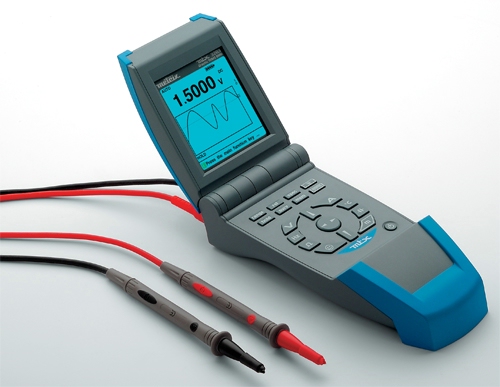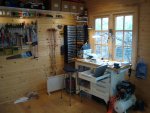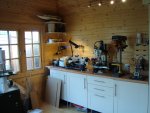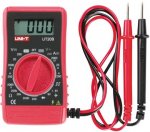Tools I wish I'd bought years ago
- Thread starter moxhamj
- Start date
Blu-tack is one of my most favourite 'tools' when soldering single/multiple circuitboards, a piece on each corner of the board ensures it'll stay fast on the desk when soldering but can easily be picked up for closer inspection or rotation etc., I've used those "helping hands" in the past but I found them to be frustrating, too fiddly to setup and if you start rotating/moving the arms too much they loosen 
I have a small desk vice with suction base for holding things besides circuitboards, rarely use the suction because it's solid metal so has a really nice weight to it.
As for magnifying stuff to look at it closely, I tried using a desk magnifyer with ring bulb but couldn't get used to it, this however is extremely useful when doing SMD work - http://www.dealextreme.com/details.dx/sku.2823 (just wish they'd used actual glass because the higher mag lenses distort what you see too much) and when I want to see really close I have a stereo microscope to hand.
The 'tool' I carry with me literally everywhere (besides my 'wire stripper' nails) is my Photon Freedom Micro, best single 5mm LED torch I've ever seen/used. Waterproof, very bright, very tough, very reliable and has a lifetime replacement guarantee to boot. Ideal for inspecting circuitboards along with a magnifying glass as you can shine it behind to see if there are any shorts, and great for going literally anywhere at night.
I have a small desk vice with suction base for holding things besides circuitboards, rarely use the suction because it's solid metal so has a really nice weight to it.
As for magnifying stuff to look at it closely, I tried using a desk magnifyer with ring bulb but couldn't get used to it, this however is extremely useful when doing SMD work - http://www.dealextreme.com/details.dx/sku.2823 (just wish they'd used actual glass because the higher mag lenses distort what you see too much) and when I want to see really close I have a stereo microscope to hand.
The 'tool' I carry with me literally everywhere (besides my 'wire stripper' nails) is my Photon Freedom Micro, best single 5mm LED torch I've ever seen/used. Waterproof, very bright, very tough, very reliable and has a lifetime replacement guarantee to boot. Ideal for inspecting circuitboards along with a magnifying glass as you can shine it behind to see if there are any shorts, and great for going literally anywhere at night.
Rotary tools have obvious uses for building enclosures, but a small cutter on the end can be used to break stripboard tracks between holes (rather than breaking tracks by taking out an entire hole) which can be useful for reducing the size of stripboard circuits or using components that don't have a gap between rows of pins (eg IDC connectors).
Rickharris
Senior Member
Try Ebay for the laser cutter - you may be surprised at the low cost of an A4 size machine. OK for the hobbyist. As for milling (and for laser) DIY may be the way forward, perhaps a Picaxe as a controller??My favourites are multi-meter (autoranging) and auto wire stripper. I'd love a laser cutter and a miller but too $$$$$$
Lots on the web about DIY http://www.instructables.com/id/20-CNC-Machine/ for example or http://www.instructables.com/tag/?q=CNC&limit%3Atype%3Aid=on&type%3Aid=on&type%3Auser=on&type%3Acomment=on&type%3Agroup=on&type%3AforumTopic=on&type%3AforumTopic=on&sort=none
or this I just found Very detailed. http://sensi.org/~svo/motori/
Last edited:
Arthaval ( Post 35)
These days the swishest little digital multi-meters (DMMs) imaginable abound for under an hours income (~US$5)- almost 2 orders of magnitude cheaper. I've been giving them away as teasers when doing mad scientist schools shows. Google for offerings, as they get better all the time. Stan.
It's hard to credit your parents are denying you a multimeter. I bought my first at 14 yo. -an analog. costing ~a teenage weeks income (US$300 in todays money), & used it almost EVERY DAY. However some 5 years later it was accidently zapped on HV - valve era technology you'll understand- & I almost wept. I can STILL recall the noise it made as it died...my wishlist:
multimeter, long nose pliers, scope (either digital/pc or analog), bench supply
These days the swishest little digital multi-meters (DMMs) imaginable abound for under an hours income (~US$5)- almost 2 orders of magnitude cheaper. I've been giving them away as teasers when doing mad scientist schools shows. Google for offerings, as they get better all the time. Stan.
NBW; also consider what happens when it conks under warranty.
Will you ship it all the way back?
Or will you bin it?
Ah, sorry, I said Warranty referring to Ebay... sorry, didn't mean to make you laugh
Come on Stan, tease us all and hand out some Multimeters. I could do with another, my main fuse has blown and I suspect your multimeters will be cheaper than a fuse
Will you ship it all the way back?
Or will you bin it?
Ah, sorry, I said Warranty referring to Ebay... sorry, didn't mean to make you laugh
Come on Stan, tease us all and hand out some Multimeters. I could do with another, my main fuse has blown and I suspect your multimeters will be cheaper than a fuse
Rickharris
Senior Member
Cheapest I can see on Rapidonline is £6.33 or £2.92 here http://www.djsoundkit.co.uk/proddetail.php?prod=Y122KB
OK not top of the range but by anyone's standards not expensive for such a versatile instrument
OK not top of the range but by anyone's standards not expensive for such a versatile instrument
Andrew Cowan
Senior Member
I received my new hot air soldering station the other day. I've spent the past few days desoldering and re-soldering SOIC RAM chips and QFP chips off old circuit boards for practice. It is very fast, acurate and simple.
I've started soldering up my PICAXE RGB POV display, using the solder paste/hot air reflow method for all SMD components. I'm delighted with the hot air gun thing - it is very quiet, heats up within a few seconds, and does a very good job.
The soldering iron attached to it is also pretty good - it heats up in a couple of seconds, and has a digital temperature readout. It comes with 10 tips, incuding some so fine I can't see them .
.
Dippy - sorry about it being from china/ebay! I perviously used a cheap chinese digitally temperature controlled station, and now this one. I never had any problems with my previous one over the 4/5 years I used it for.
I'd recommend this one to anyone doing ocassional SMD work - SparkFun have plenty of experience with these cheap chinese soldering stations, and also recommend them.
A
Rick - the site with the £2.90 multimeter only quote £6 for next day delivery. Ebay will give you one for £3.90.
I've started soldering up my PICAXE RGB POV display, using the solder paste/hot air reflow method for all SMD components. I'm delighted with the hot air gun thing - it is very quiet, heats up within a few seconds, and does a very good job.
The soldering iron attached to it is also pretty good - it heats up in a couple of seconds, and has a digital temperature readout. It comes with 10 tips, incuding some so fine I can't see them
Dippy - sorry about it being from china/ebay! I perviously used a cheap chinese digitally temperature controlled station, and now this one. I never had any problems with my previous one over the 4/5 years I used it for.
I'd recommend this one to anyone doing ocassional SMD work - SparkFun have plenty of experience with these cheap chinese soldering stations, and also recommend them.
A
Rick - the site with the £2.90 multimeter only quote £6 for next day delivery. Ebay will give you one for £3.90.
Last edited:
Arthaval,
Just a thought, do you have pocket money? Can you save £6.99 and do you have a Maplin store near you? This might be your solution:-
http://maplin.co.uk/Module.aspx?ModuleNo=37279
Saving (hopefully circuit sucess) may help you parent understand the importance of this to you.
I'd like to get Andrew's Hot Air Soldering Station on my Christmas list but would also like some dry workshop space so that I don't have to unpack my kit from a box every time I want to work on a project.
regards,
colin
Just a thought, do you have pocket money? Can you save £6.99 and do you have a Maplin store near you? This might be your solution:-
http://maplin.co.uk/Module.aspx?ModuleNo=37279
Saving (hopefully circuit sucess) may help you parent understand the importance of this to you.
I'd like to get Andrew's Hot Air Soldering Station on my Christmas list but would also like some dry workshop space so that I don't have to unpack my kit from a box every time I want to work on a project.
regards,
colin
(Genuinely) interested in how it fares in 6 months time or so - hand (iron) soldering 1206 components isn't that hard, but when doing loads of them it gets tedious and the "hot-air" finish looks more professional - remember to let us knowI received my new hot air soldering station the other day...
How's the "foreign" power supply, croc clips, jumper wires etc? (amazing what you can find in 2 minutes on t'web
Hey that's the exact same one I use at work!I received my new hot air soldering station the other day.
Been using it for a few months now and it's really nice to use, my only gripe with it is that the cable on the normal iron is annoyingly short, so I ordered a plug/socket from Maplin to make an extension cable rather than hacking up the existing cable.
I can solder 0603 components easily with the normal iron but have to use hot air + solder paste for the 0.5 mm pin pitch chips.
On the subject of multimeters, this is my 'baby':

Metrix MTX3282, brand new costs a small fortune but managed to get one off eBay for around 1/5 RRP.
Andrew Cowan
Senior Member
Haku - the soldering iron lead on mine is 90cm - perhaps they've redesigned it slightly? The lead on the hot air gun is 80cm, but it feels less as the lead is inflexible.
Martin - I'll let you know how it lasts. I've just realized that the air intake is inside the housing, yet there are no ventillation holes to let air in. Must be close to a perfect vacuum inside when operating! Apart from that, it seems well made - lots of rubber mounting and vibration absorbtion make it very quiet.
Foreign power supply? My p/s is from Rapid! (And no, I haven't checked where they get it from, although I have an idea...).
My cheap breadboard leads are good, apart from when they fall apart... I started with about 2000 leads, and I'm now down to about 1970.
Last project I finished was my solder fume extraction system. A length of tumble-dryer-extractor hose, and a computer fan. I adapted the computer fan to use a SPEED 400 motor, and it draws about 30W (at which power any components on the desk get sucked into the extraction system).
A
Edit: Pictures of my work area (shed) added
Martin - I'll let you know how it lasts. I've just realized that the air intake is inside the housing, yet there are no ventillation holes to let air in. Must be close to a perfect vacuum inside when operating! Apart from that, it seems well made - lots of rubber mounting and vibration absorbtion make it very quiet.
Foreign power supply? My p/s is from Rapid! (And no, I haven't checked where they get it from, although I have an idea...).
My cheap breadboard leads are good, apart from when they fall apart... I started with about 2000 leads, and I'm now down to about 1970.
Last project I finished was my solder fume extraction system. A length of tumble-dryer-extractor hose, and a computer fan. I adapted the computer fan to use a SPEED 400 motor, and it draws about 30W (at which power any components on the desk get sucked into the extraction system).
A
Edit: Pictures of my work area (shed) added
Attachments
-
975.7 KB Views: 49
-
891 KB Views: 47
Last edited:
Andres Rodriguez
New Member
Andrew, what paste do you use to solder with the hot air soldering stationI received my new hot air soldering station the other day. I've spent the past few days desoldering and re-soldering SOIC RAM chips and QFP chips off old circuit boards for practice. It is very fast, acurate and simple.
Ebay will give you one for £3.90.
and where do you buy it?
Very nice neat shed
Andrew Cowan
Senior Member
Marmitas - I'm using this paste - I bought the last batch very cheaply of ebay - it was a few months past the use-by date, but still works fine.
A
A
Andrew, you got lucky with your iron cable length, my hot air cable is fine at 70cm but the iron is only 50cm 
Still getting to grips with solder paste though, initially started off with a small pot which I used a craft knife to put onto the pads, then a syringe but that proved difficult to use as you had to squeeze it so hard to get anything out, back to the pot now but have got a syringe dispenser to setup sometime with a compressor. Hopefully the dispenser will prove to be good to work with.
Still getting to grips with solder paste though, initially started off with a small pot which I used a craft knife to put onto the pads, then a syringe but that proved difficult to use as you had to squeeze it so hard to get anything out, back to the pot now but have got a syringe dispenser to setup sometime with a compressor. Hopefully the dispenser will prove to be good to work with.
Andrew Cowan
Senior Member
I'm using a syringe at the moment, but don't find it too much trouble to get out. Maybe I'm using thinner solder? I don't keep it in the fridge - I found that when I do, it gets too hard to dispense by hand.
Andrew
Andrew
Last edited:
My single most-used piece of gear (that I wish I'd purchased much sooner) is an older HP model 1980 analog oscilloscope with microprocessor control. I LOVE the auto-setup function on that unit! Following closely behind is my trusty HP RF spectrum analyzer, currently configured for use in the HF and lower VHF regions. Frequency counter, digital multimeters, various signal and function generators, several backup 'scopes and meters, and several RF power measurement systems round out the test equipment collection I wish I'd purchased long before I did. As for tools, WAAAYY at the top of the list is my Pace desoldering station. I thought it was rather expensive when I bought it 10 years ago for $650.00 US, but its more than paid for itself over the years in time saved. Looking back, that's the one tool that I actually DID buy when I wanted to, lol!
Here's that budget DMM I mentioned- practically every school in NZ has stashes of them. Not auto off, but their small 12V battery lasts ages. They're so cheap & reliable that folks even use them as inbuilt panel meters. Just switch to the range you want, provide an external 12V supply & mount behind a suitable front panel cutout.
Attachments
-
26.3 KB Views: 29
Out of interest, what does the mode with the square wave icon next to it do? I used to have a second-hand multimeter with that on it (hence no manual), but I could never get it to do anything (I thought it might have been a frequency counter, but couldn't get any signal to produce any results on its screen).
Andrew Cowan
Senior Member
On my multimeter, the square wave button is for measuring frequency.
Andrew Cowan
Senior Member
Could be damaging to the circuit! On the multimeters with fixed leads (as seen in post 62), when connected to the current range, does the multimeter connect the two leads across a shunt resistor? Could be dangerous in unknowing hands (eg schools).
The internal fuse just blows- those DMMs are only rated 200mA DC current. Such a low Imax is quite in keeping with their typical AA battery/LED type typical use of course. Of course the wired leads mean students don't forget to move the lead back to the Volts/Ohms socket after a current reading. FWIW -perhaps 90% of noted NZ DMM schools/hobbiest use seems to relate to just measuring battery voltages & checking wiring continuity.



